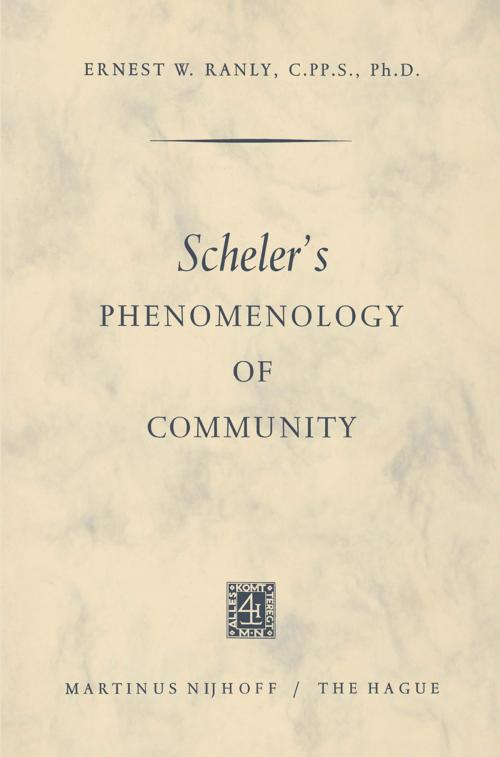| Author: | Ernest W. Ranly | ISBN: | 9789401508445 |
| Publisher: | Springer Netherlands | Publication: | December 6, 2012 |
| Imprint: | Springer | Language: | English |
| Author: | Ernest W. Ranly |
| ISBN: | 9789401508445 |
| Publisher: | Springer Netherlands |
| Publication: | December 6, 2012 |
| Imprint: | Springer |
| Language: | English |
My own serious study of Max Scheler began in 1958 when I pre sented a Master's thesis to St. Louis University under the direction of Professor Vernon]. Bourke on Scheler's value-theory. Three years later when I returned to complete my doctorate work at St. Louis University I returned also to the study of Max Scheler. In the meantime, several more volumes of the Gesammelte Werke had appeared, several new translations of Scheler were published and the whole area ofphenome nology began to be more favorably accepted by the American intel lectual community. My doctoral dissertation was on Scheler's theory of community under the expert and careful direction of Professor James Collins. The bulk of the present work is a direct result of my work at St. Louis University. I have never regretted the time and effort spent on the study of Scheler. He can be classified as nothing short of a genius, not only in the breadth of his interests but also in the vitality, unity and depth of his thought. Most students of Scheler criticize his lack of unity; I claim to find strong lines of inner consistency throughout his writings. In the second place, my study of Scheler has put me into contact with many of the most dominant intellectual influences of the day.
My own serious study of Max Scheler began in 1958 when I pre sented a Master's thesis to St. Louis University under the direction of Professor Vernon]. Bourke on Scheler's value-theory. Three years later when I returned to complete my doctorate work at St. Louis University I returned also to the study of Max Scheler. In the meantime, several more volumes of the Gesammelte Werke had appeared, several new translations of Scheler were published and the whole area ofphenome nology began to be more favorably accepted by the American intel lectual community. My doctoral dissertation was on Scheler's theory of community under the expert and careful direction of Professor James Collins. The bulk of the present work is a direct result of my work at St. Louis University. I have never regretted the time and effort spent on the study of Scheler. He can be classified as nothing short of a genius, not only in the breadth of his interests but also in the vitality, unity and depth of his thought. Most students of Scheler criticize his lack of unity; I claim to find strong lines of inner consistency throughout his writings. In the second place, my study of Scheler has put me into contact with many of the most dominant intellectual influences of the day.















